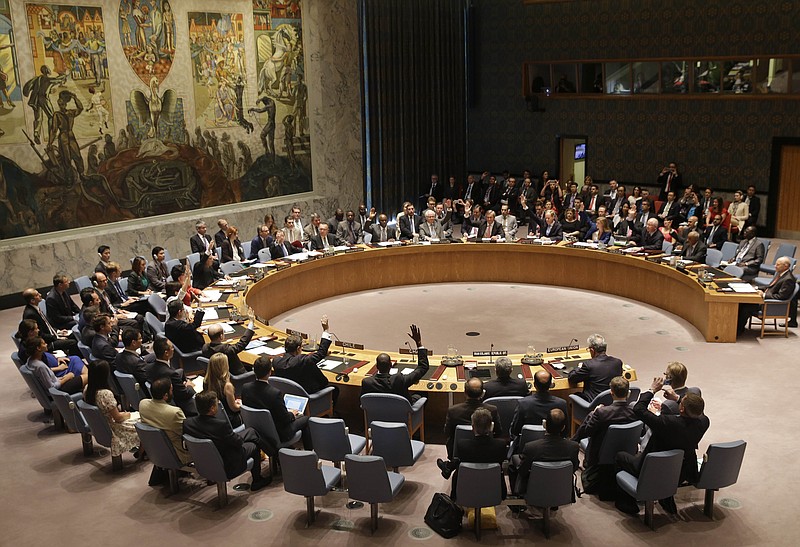UNITED NATIONS -- The United States will demand today that all United Nations sanctions be reimposed against Iran, President Donald Trump said Wednesday, a move that follows America's failure to extend an arms embargo against Tehran.
The administration's insistence on snapping back international sanctions against Iran sets the stage for a dispute. It's possible that the U.S. call will be ignored by other U.N. members -- an outcome that could call into question the U.N. Security Council's ability to enforce its own legally binding decisions.
"It's a snapback," Trump said Wednesday.
Trump said Secretary of State Mike Pompeo will travel to New York today to present the U.S. demand to reimpose the sanctions, accusing Iran of significant noncompliance with the 2015 nuclear deal.
The Trump administration wants to reimpose all international sanctions that had been eased under that deal. Other nations claim the U.S. has no standing to make the demand because the Trump administration pulled the U.S. out of the Iran nuclear deal two years ago.
[Video not showing up above? Click here to watch » https://www.youtube.com/watch?v=SIa_GSqD9SE]
"Iran will never have a nuclear weapon," Trump said.
"This will be a fully valid enforceable Security Council resolution and we have every expectation that it will be enforced just like every other Security Council resolution that is in place," he said. "We will be in full compliance with that and we have every expectation that every country in the world will live up to its obligations."
Snapback allows participants to demand the restoration of all U.N. sanctions in a complicated procedure that cannot be blocked by a veto.
Pompeo and Trump have made no secret of their intention to invoke snapback, especially since their attempt to extend the arms embargo failed last Friday. The U.S. recieved just one other "yes" vote, with China and Russia opposed and the 11 other members abstaining.
"Iran's support for its proxies in Syria only helps to bolster the Assad regime and undermine the U.N. process," said U.S. Ambassador Kelly Craft in remarks at Wednesday's council meeting on Syria. "How will giving Iran access to more weapons serve the interests of international peace and security?"
The administration's snapback move is opposed by China and Russia as well as the other Security Council members, including U.S. allies Britain and France, and could set the stage for a battle over the legitimacy of the U.N.'s most powerful body.
Alone among the council's 15 members, the U.S. argues that as an original participant in the nuclear deal it retains the right to demand restoration of sanctions. The others, which still support the deal, maintain the U.S. lost that standing when Trump pulled out of the accord in 2018, but it isn't clear if they can stop the invocation of snapback through technical procedural means.
Under the terms of Security Council Resolution 2231, which enshrined the nuclear deal and to which the U.S. remains a party, the invocation of snapback for significant Iranian noncompliance starts a 30-day clock during which the council must vote affirmatively to continue the sanctions relief that Iran was given in return for curbs on its nuclear program.
Pompeo is expected to present evidence of noncompliance, likely the latest reports of the U.N. nuclear watchdog, the International Atomic Energy Agency, today. Iran does not deny violating some terms of the deal but says its actions have been forced by the U.S. withdrawal and the Trump administration's reimposition of U.S. sanctions.
The United States or any other permanent member of the council could use its veto to block the continuation of sanctions relief. In theory, that would result in the reimposition of sanctions.
But whether any other council member will respond to the U.S. by introducing a resolution to extend sanctions relief is an open question.
